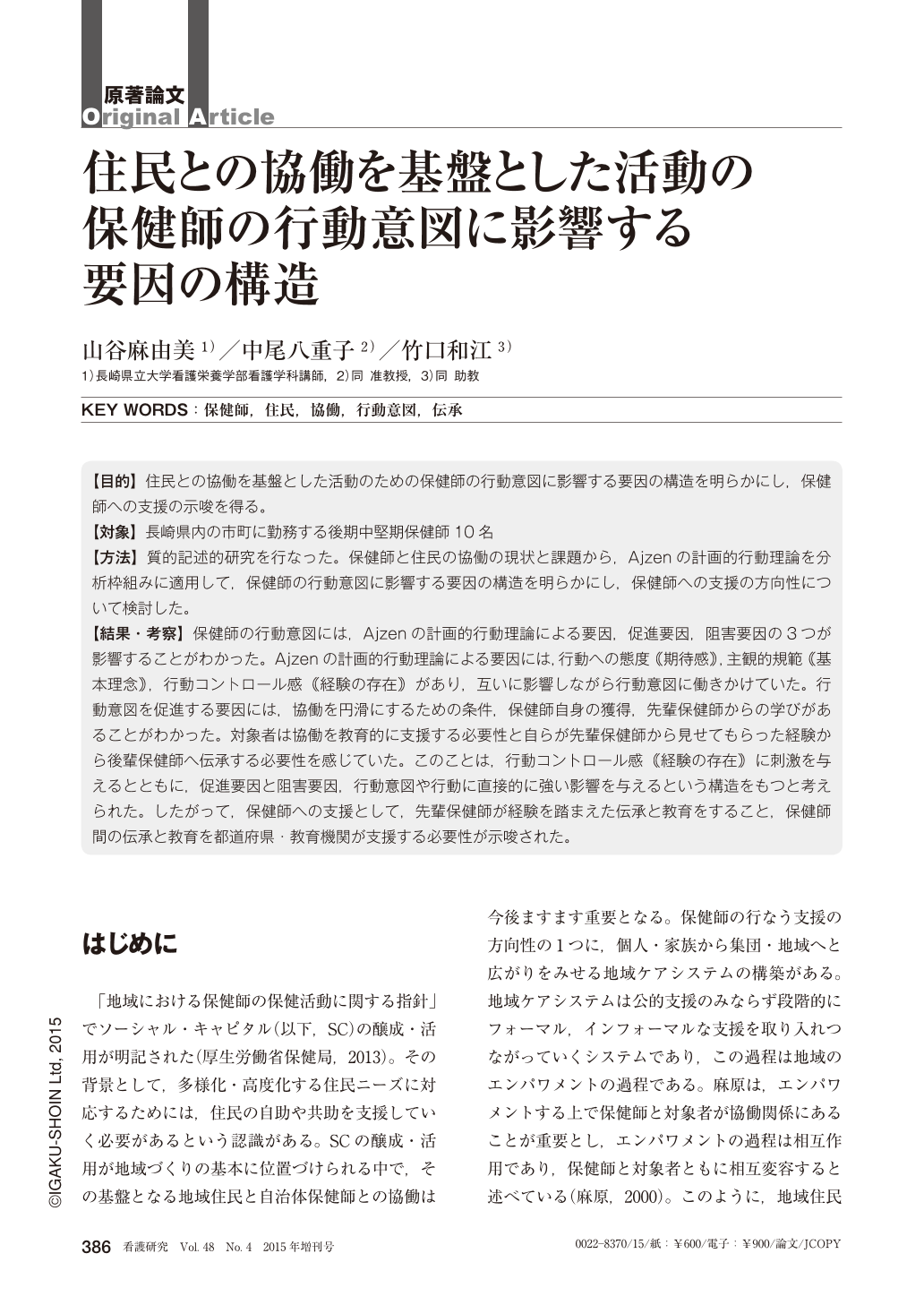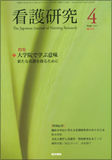Japanese
English
- 有料閲覧
- Abstract 文献概要
- 1ページ目 Look Inside
- 参考文献 Reference
【目的】住民との協働を基盤とした活動のための保健師の行動意図に影響する要因の構造を明らかにし,保健師への支援の示唆を得る。
【対象】長崎県内の市町に勤務する後期中堅期保健師10名
【方法】質的記述的研究を行なった。保健師と住民の協働の現状と課題から,Ajzenの計画的行動理論を分析枠組みに適用して,保健師の行動意図に影響する要因の構造を明らかにし,保健師への支援の方向性について検討した。
【結果・考察】保健師の行動意図には,Ajzenの計画的行動理論による要因,促進要因,阻害要因の3つが影響することがわかった。Ajzenの計画的行動理論による要因には,行動への態度((期待感)),主観的規範((基本理念)),行動コントロール感((経験の存在))があり,互いに影響しながら行動意図に働きかけていた。行動意図を促進する要因には,協働を円滑にするための条件,保健師自身の獲得,先輩保健師からの学びがあることがわかった。対象者は協働を教育的に支援する必要性と自らが先輩保健師から見せてもらった経験から後輩保健師へ伝承する必要性を感じていた。このことは,行動コントロール感((経験の存在))に刺激を与えるとともに,促進要因と阻害要因,行動意図や行動に直接的に強い影響を与えるという構造をもつと考えられた。したがって,保健師への支援として,先輩保健師が経験を踏まえた伝承と教育をすること,保健師間の伝承と教育を都道府県・教育機関が支援する必要性が示唆された。
Objectives : To identify the structure of factors influencing behavioral intentions of public health nurses towards their collaboration with community residents and the direction of support to complement these intentions.
Subjects : Ten late-middle-ranking public health nurses working in the cities and towns of Nagasaki Prefecture.
Methods : We conducted a qualitative and descriptive study. Based on actual situations and challenges of collaboration between public health nurses and community residents, we used Ajzen’s theory of planned behavior as an analytical framework to identify the structure of factors influencing the behavioral intentions of these nurses towards their collaboration with the residents, as well as investigate the direction of support required to promote this collaboration.
Results and Discussion : Factors influencing behavioral intentions of the public health nurses consisted in factors of Ajzen’s theory of planned behavior, promoting factors, and limiting factors. The factors of Ajzen’s theory of planned behavior identified included attitudes toward behavior ((expectation)), subjective norms ((basic principle)), and perceived behavioral control ((experience)) ; these reasons influenced the nurses’ behavioral intentions toward each other. Factors promoting behavioral intentions included requirements to facilitate the collaboration, the nurses’ experiences, and learning from their seniors. The subjects felt the need for educational support to achieve this collaboration and to convey what they had learned from their seniors to their juniors. This indicates a structure in which these factors may stimulate the nurses' perceived behavioral control as well as directly and strongly influence promoting factors, limiting factors, their behavioral intentions and behavior. Therefore, the study suggests that senior nurses should convey their experiences to their juniors and educate them based on these experiences, which should be supported by municipalities and educational institutions.

Copyright © 2015, Igaku-Shoin Ltd. All rights reserved.


